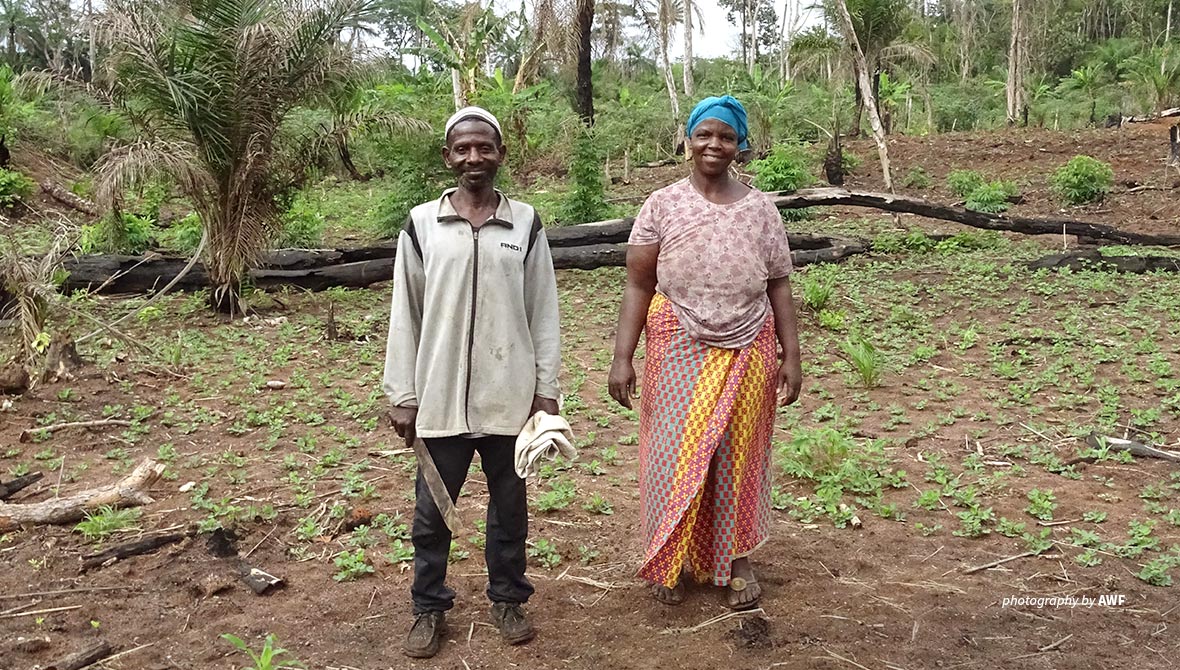Conserving the Congo Basin lifts DRC’s forest communities out of poverty

AWF works with cassava farmers like Raymond Sango and his wife to improve yields and find markets for their products
Absorbing 1.5 percent of the world's total annual carbon emissions, the forests of the Democratic Republic of Congo — one of the six countries that make up the Congo Basin — are a vital lifeline for indigenous and local populations, as well as a crucial habitat for threatened wildlife species. Maintaining the integrity of these forests is vital not only for the future of Africa, but also for the future of the world.
Global efforts to combat the effects of climate change and biodiversity loss depend on the preservation of the Congo Basin’s rich and lush ecosystem. However, DRC’s portion of the Congo Basin forest is increasingly threatened by deforestation, environmental degradation, poaching, population growth, and the impact of climate change. According to the World Bank, the population living in DRC's forested areas stands at approximately 575,000. They rely on the fragile ecosystem to make ends meet.
African Wildlife Foundation works in two landscapes in DRC — Maringa Lopori Wamba in north-central DRC and Bili-Uele further north — partnering with wildlife authorities and local groups to provide income-generating alternatives to activities that degrade forests and threaten wildlife.
A farmer from Bili-Uele, Georgette Nyamwero, said, “We were practicing slash-and-burn agriculture to sustain our livelihoods. Personally, I was doing it not only out of habit but also out of ignorance of its harmful effects on biodiversity.”
AWF also intervenes in the Central Zone of Bili-Mbomu, training local communities on sustainable agriculture techniques and helping them set up their fields to improve their yield so that forests are not converted into farmland. In addition to improving production, AWF introduced the processing of cassava into flour.
"We are now producing Gungo nga ga Bili, the local cassava flour that is so appreciated by the community because of its taste. With the access to the market facilitated by AWF, all of us, sellers and buyers, are winners because on the one hand, customers buy a finished product and on the other hand, sellers offer the product at a reasonable price — 20 kg at US $18 — which allows us to have enough profit,” said Raymond Sango, one of the beneficiaries of the project.
Sustainable fishing and land-use planning restore degraded landscapes
In addition to agriculture, AWF has trained the local community of Bili-Uele on sustainable fishing practices. "Honestly, before AWF came, I never imagined that fish could be domesticated through fish farming. I also had no idea that poisoning the water for fishing was harmful to aquatic biodiversity. That is why I am sincerely grateful for the contributions of the Community Based Counter Wildlife Trafficking project,” confessed Joseph Bamsokake, a fisherman from Bondo.
Moreover, he makes fewer losses because he smokes or dries the surplus fish. "It may seem trivial to some, but for me, who survives only by fishing, it is very important. Today, I no longer worry about the daylight to sell the fish for fear that they will perish because I know how to preserve them now," he said.
The sustainable agriculture and fishing techniques have been a positive follow-up to the participatory mapping initiated in nine clusters of the landscape to develop a land-use plan. By zoning portions of the land for particular uses, AWF has oriented the community to adopt farming methods that restore the environment. For instance, farmers are encouraged to practice agriculture closer to the roads. Additionally, AWF has introduced sedentary agriculture that allows farmers to stay in one place and rotate crops so that the abandoned spaces can regenerate.
Supporting conservation-friendly entrepreneurship
In the Maringa Lopori Wamba landscape, with support from the Arcus Foundation, AWF and Village Enterprise are subsidizing small business owners with up to US $300 in microgrants and training local associations to improve their standard of living. Overall, the program reduces the human footprint on biodiversity by providing conservation-friendly livelihood alternatives.
Studies in this landscape have shown that the poorest and most vulnerable people are those who are totally dependent on natural resources for their survival. AWF and Village Enterprise determined the standard of living of the households through socio-anthropological surveys before triggering the empowerment process of the local communities.
Samy Mpetsi, a business mentor from the Bongandanga territory, explained the process. "AWF recruited four [mentors], after which we were trained in different modules related to business management and savings for 8 days, with three modules a day. After the training, we went back to our villages, and passed on the training to the business owners in business groups.”
From these trainings, he continued, "we came out of ignorance and helped others to do the same.” Mpetsi said, “I used to survive only on hunting, but today I have more than two income-generating activities and I know very well how to save. I realized that spending time on hunting is almost a waste of time, so since this training, I am working to multiply my assets while protecting the forest of my forefathers.” Thanks to this approach, the local community is gradually withdrawing from hunting activities to devote themselves to their own enterprises.
Japhet Ntwaseke, in charge of scientific research and biomonitoring of the Lomako Yokokala Wildlife Reserve highlighted the ecological significance of the poverty alleviation program. “Without a doubt, with the support of AWF, there is an increase of animals and especially an enlargement of the range of elephants and bonobos in the reserve, which is encouraging for us eco-guards who have dedicated their whole life to the conservation of wildlife.”
"In the sectors supported by the AWF and Village Enterprise grants, more and more hunters are laying down their weapons.In the latest arrests of poachers, we have not recorded any who are part of these sectors," noted Gentil Kisangani, site manager of the Lomako Yokokala Wildlife Reserve.
"Without the fauna, the flora would also disappear, causing enormous damage to our planet and accentuating the effects of climate change, we are pleased to see this increase of species in the reserve but also in the community forest,” he continued.
At the same time, AWF has been working with the the Institut Congolais pour la Conservation de la Nature (ICCN) to improve security in the protected area. Niclette Anitu, a resident of the Lomako sector, pondered, “Since AWF has been supporting the Lomako Yokokala Wildlife Reserve eco-guards, we feel they are bolder and more rigorous."
The local Congo Basin community in DRC appreciates AWF's efforts to preserve and combat climate change and is hopeful that they will bear great fruit in the years to come. Marcel Gyamono, chief of Gwamnagi chiefdom, reflected, "I know it won't be the result of a magic wand, but my greatest wish is that AWF, by supporting ICCN, will help us to regain the joy of living in the village. Listening to the cry of the animals and the birds singing so that our children live this happiness that we tasted in our youth.”
> See how improving security in the Bili-Uele landscape is improving lives
